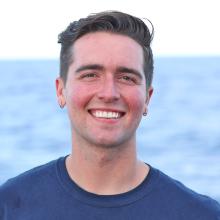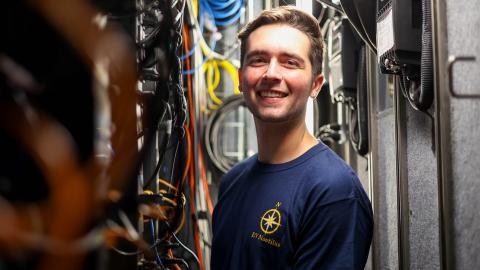
Logan Ossentjuk
Tell us about your work/research. What kinds of things do you do?
I tend to wear many hats. At the moment, my master's project is focused on reducing derelict fishing gear and debris off the coast of Southern California. Our goal is to mitigate ghost-fishing and raise awareness about Ocean Defenders Alliance (ODA), a non-profit driven to collect ocean debris and return lost traps directly to fishers. I am leading the effort to create a promotional film of ODA’s work, fisher’s role as stewards of the sea and ecosystem health in the face of an ever-changing ocean. I am also a NOAA Pathways Intern. There, I am engaged in authorizing research permitting for endangered species, crafting a website about the relationship between tribes and NOAA in the Pacific Northwest, and creating an environmental justice tool to further community engagement throughout NOAA’s Protected Resources Division. The key thread that ties this work together is a passion for community and ecosystem health.
What sparked your initial interest in your career?
My fascination with marine organisms began at age 3 reveling in a flourish of Reef Triggerfish while snorkeling in Hawaii. This experience drove me to pursue a career in marine biology and has rooted my fascination with the ocean. However, my career interest has not been a straight path. In my first quarter of college, I took a video art class to fulfill a core requirement and fell in love with film as a medium for communication. This shifted my focus to pursue a career as a marine advocate who conducts research and produces educational, call-to-action conservation films. I believe that increasing awareness of the dynamic relationship between humans and the natural world will drive people to care and act toward their mutual protection.
Who influenced you or encouraged you the most?
My two film professors Alexander Johnston and Benjamín Schultz-Figueroa encouraged me to pursue my interest in science communication and advocacy. They pushed me to go a step beyond what was expected to create something new that could act as a spark for change.
What element of your work/study do you think is the most fascinating?
The most fascinating part of my work is the conversations I get to have with community members. I have learned so much from commercial fishers over the last few months about just how misunderstood many of them are. These experiences have only strengthened my belief that we must continue to increase collaboration across and between interest groups.
What other jobs led you to your current career?
I have had multiple opportunities that helped me toward my dream of becoming a marine conservation advocate: film production intern, DJ, camera operator, board member & head of digital media, summer activist fellow, podcast host, and documentarian. I believe in the power of versatility and have worked to craft my experiences like a Swiss army knife. I have been able to combine my science skills with communication positions which taught me more about science and people differently than otherwise possible.
What are your degrees and certifications?
Bachelor of Science in Marine and Conservation Biology – Seattle University 2021
Master of Environmental Science and Management – University of California, Santa Barbara
Advanced Open Water Diver
What are your hobbies?
I love playing guitar, surfing, climbing, and taking photos, both film and digital. Mostly, I love meeting new people and learning about the fires that drive them.
What advice would you give someone who wants to have a career like yours?
If you want to be a successful scientist, you must also understand people. So often with in scientific careers, the research, organisms, and mechanisms are the primary focus. However, outside of the classroom and the lab, you will have to employ this knowledge within social ecosystems. Learning to use creative means toward communicating complex concepts will be massively beneficial in instituting scientific objectives for the benefit of humans and nature as one.
How did you get involved with the Ocean Exploration Trust?
I applied for SEIP after learning about the program from following Nautilus Live and Ocean Exploration Trust since 2017. I was searching for positions in 2019 and found the Video Engineering Internship. It aligned perfectly with my passion for science communication and collaboration. I am delighted to be a part of the expedition team for 2023.
Expeditions
Logan participated in the following Ocean Exploration Trust expeditions:

